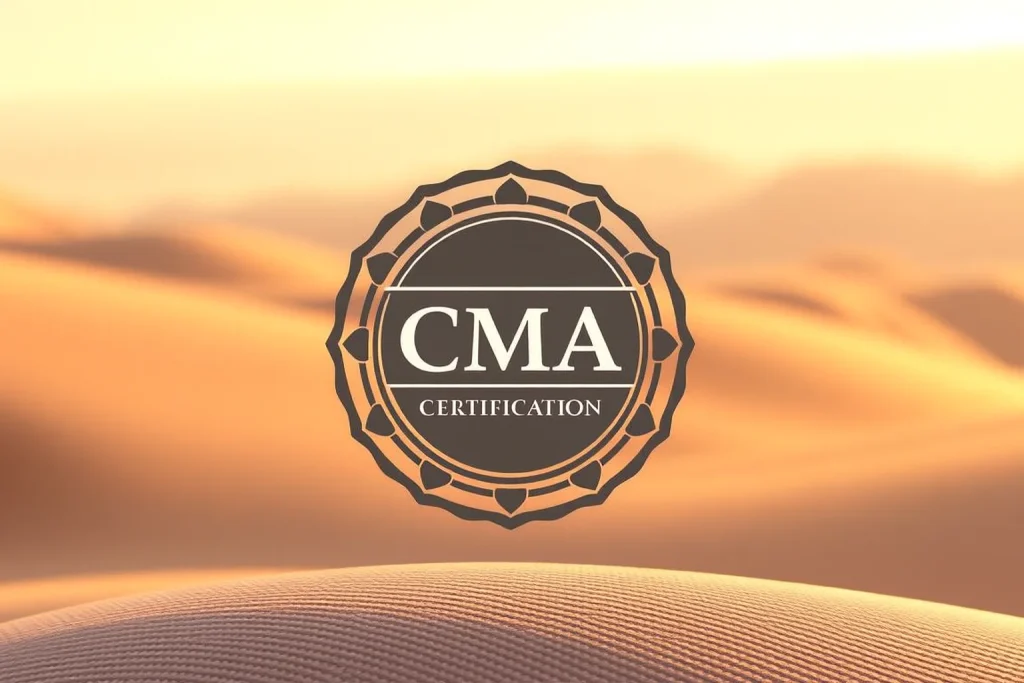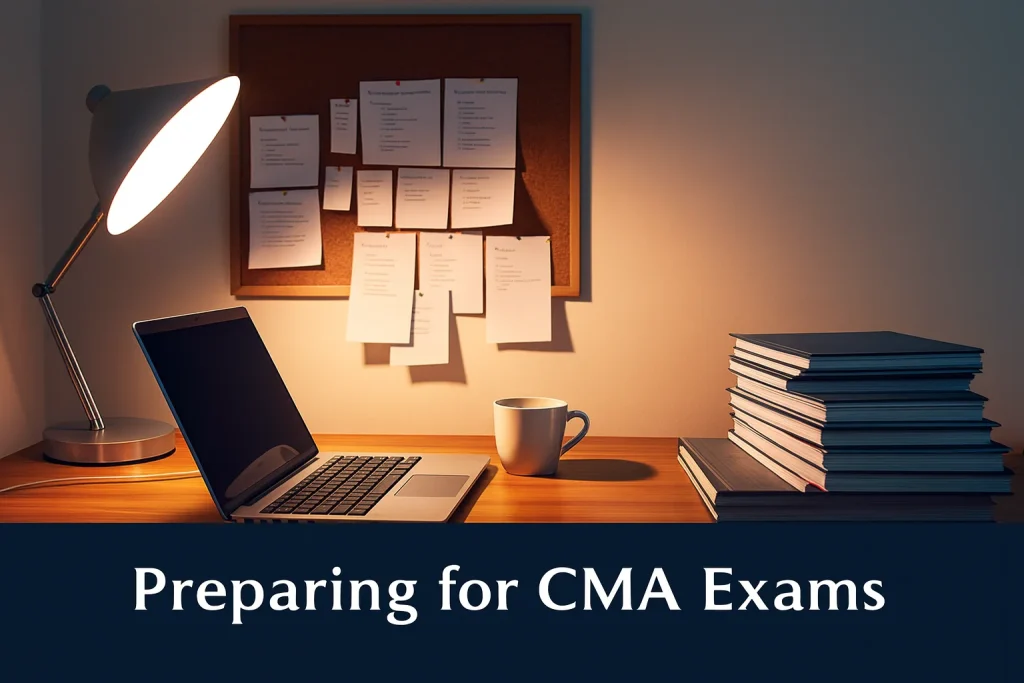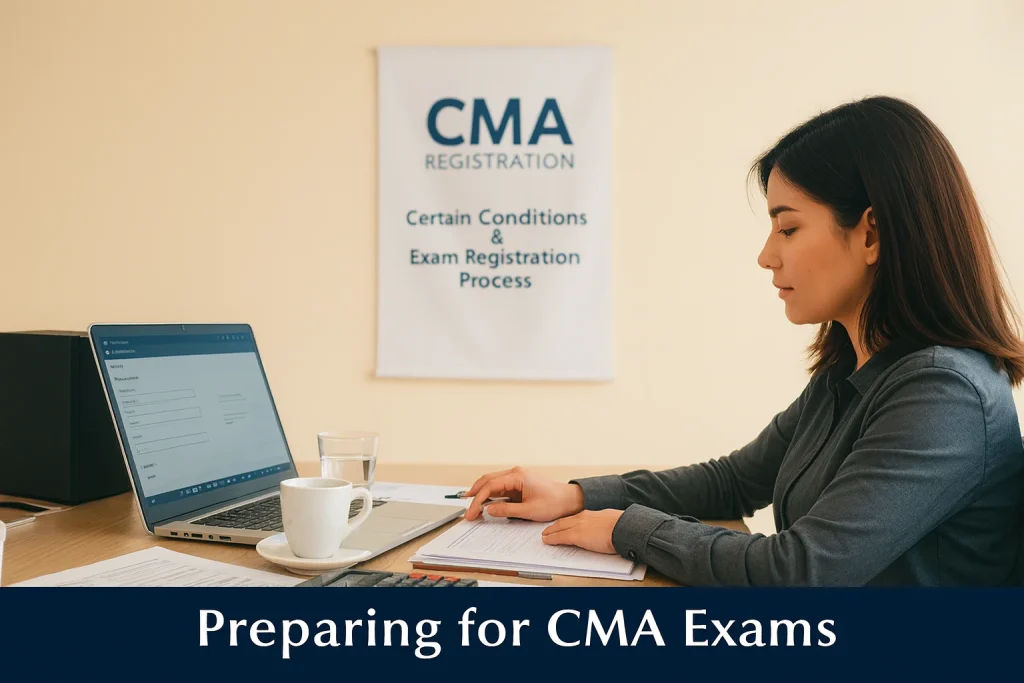CMA Examspursuing a career in management accounting requires a deep understanding of the Certified Management Accountant (CMA) certification. As a professional in this field, I'm excited to guide you through the various aspects of CMA Exams, including the courses, eligibility criteria, fees, and career prospects.
The certification is a prestigious credential that can open doors to new opportunities in the world of finance. To get started, it's essential to understand the eligibility criteria and course requirements. In this article, we'll explore the key aspects of CMA Exams and what you can expect from the certification process.
Key Takeaways
- Understanding the CMA certification and its benefits
- Eligibility criteria and course requirements for CMA Exams
- Fees associated with the CMA certification process
- Career prospects and opportunities after becoming a CMA
- Key aspects to consider when preparing for CMA Exams
What is CMA Certification?
The Certified Management Accountant certification is a prestigious credential that validates an individual's expertise in financial management and strategic decision-making. It is designed for professionals who aspire to excel in management accounting and financial management.

Definition and Governing Body
The Certification is governed by the Institute of Management Accountants (IMA), a global professional organization that provides resources, certifications, and networking opportunities for accounting and finance professionals. The IMA sets the standards for the program, ensuring its integrity and relevance in the industry.
Global Recognition of CMA
The Certification is recognized globally as a mark of excellence in management accounting. It is respected by employers worldwide for demonstrating a professional's expertise in financial planning, analysis, and strategic decision-making. Some key benefits of global recognition include:
- Enhanced career opportunities worldwide
- Increased credibility among employers and peers
- Demonstrated commitment to professional excellence
Value of CMA in Today's Business Environment
In today's fast-paced business environment, the Certification holds significant value. It equips professionals with the skills needed to drive business success through strategic financial management and analysis. As businesses continue to evolve, the demand for skilled management accountants with Certification is expected to grow.Understanding Exams Structure and Content
Understanding the structure and content of the exam is essential for effective preparation. The exam is designed to test a candidate's knowledge and skills in financial management, and it is divided into two parts.
Part 1: Financial Planning, Performance, and Analytics
Part 1 focuses on financial planning, performance, and analytics, which are critical components of management accounting. This part assesses a candidate's ability to plan, analyze, and make decisions based on financial data.
Key Topics and Weightage
The key topics in Part 1 include financial statement analysis, budgeting, and forecasting. These topics are given significant weightage, as they form the foundation of financial planning and performance evaluation. Candidates should be well-versed in these areas to perform well in this section.
Part 2: Strategic Financial Management
Part 2 is centered on strategic financial management, which involves making strategic decisions that impact an organization's financial health. This part tests a candidate's ability to apply financial management concepts to real-world scenarios.
Key Topics and Weightage
Key topics in Part 2 include financial strategy, risk management, and investment decisions. These areas are crucial for strategic financial management and are given considerable weightage in the exam.
Exam Format and Scoring System
The exam is conducted in a multiple-choice and essay format. The scoring system is designed to assess a candidate's knowledge and application skills. Understanding the exam format and scoring system is vital for effective preparation. Eligibility Requirements
To become a Certified Management Accountant (CMA), it's essential to understand the eligibility requirements set by the Institute of Management Accountants (IMA).
Educational Qualifications
The IMA requires candidates to have a bachelor's degree from an accredited institution or an equivalent degree. The degree can be in any discipline, but having a background in accounting or a related field can be beneficial.
Professional Experience Requirements
Professional experience is a crucial aspect of eligibility. Candidates need to have two continuous years of professional experience in management accounting or a related field. This experience can be before, during, or after passing the exam.
IMA Membership Requirement
While not mandatory, becoming an IMA member can provide numerous benefits, including access to exclusive resources, networking opportunities, and discounts on exam fees. IMA membership can enhance your journey.
Eligibility Verification Process
The IMA verifies the eligibility of candidates through a detailed process. This includes submitting transcripts, verifying professional experience, and ensuring compliance with IMA's policies.To summarize, eligibility requirements include meeting educational qualifications, having relevant professional experience, considering IMA membership, and undergoing the eligibility verification process. Ensuring you meet these criteria is vital for a successful application.
- Educational qualifications: Bachelor's degree from an accredited institution
- Professional experience: Two continuous years in management accounting or a related field
- IMA membership: Optional but beneficial for resources and networking
- Eligibility verification: Detailed process involving transcript submission and experience verification

Complete Breakdown of CMA Exam Fees
Understanding the costs associated with the CMA exam is crucial for candidates planning their certification journey. The expenses involved in becoming a Certified Management Accountant include various components that need to be considered.
IMA Membership Fees
To be eligible for the exam, candidates must be members of the Institute of Management Accountants (IMA). The annual membership fee for IMA is a significant part of the overall cost. As a member, candidates gain access to valuable resources, including professional development opportunities and networking events.
CMA Entrance Fee
The entrance fee is a one-time payment required when a candidate first registers for the program. This fee grants access to the exam and related study materials.
Exam Registration Fees
Exam registration fees are paid for each part of the CMA exam that a candidate registers for. These fees can vary based on the candidate's IMA membership status and the timing of their registration.Additional Costs to Consider
Beyond the direct exam fees, candidates should also budget for study materials, review courses, and potentially, travel costs for exam day. These expenses can add up, so it's essential to factor them into the overall budget.
Financial Assistance Options
For candidates facing financial constraints, there are financial assistance options available, including scholarships and payment plans offered by the IMA or other organizations. Exploring these options can help make the certification more accessible.
Preparing for CMA Exams: Courses and Study Materials
A comprehensive study strategy is essential for CMA exam success. To achieve this, candidates can choose from a variety of study materials and courses tailored to their learning needs.
Self-Study Programs
Self-study programs offer flexibility for candidates who prefer to study at their own pace. These programs typically include comprehensive study materials, practice questions, and online resources. Popular self-study providers include Wiley and Gleim, known for their high-quality content and user-friendly interfaces.
Instructor-Led Courses
Instructor-led courses provide a structured learning environment, ideal for those who benefit from classroom instruction and direct interaction with instructors. These courses are available online and in-person, catering to different preferences and schedules.University Programs
Some universities offer specialized review courses as part of their accounting or finance curricula. These programs can be particularly beneficial for students who are pursuing or have completed a relevant degree.
Top CMA Review Providers
When selecting a review provider, it's crucial to consider their reputation, pass rates, and the comprehensiveness of their materials. Top providers often include Hock, Wiley, and Gleim, each offering unique strengths and study resources.
Essential Study Materials
Essential study materials for the exam include the Institute of Management Accountants (IMA) study materials, practice questions, and mock exams. Candidates should also utilize online forums and study groups to enhance their learning experience.
Study Material | Description | Provider |
Comprehensive Study Guides | Detailed guides covering all exam topics | Wiley, Gleim |
Practice Questions | Questions simulating the exam format | Hock, Wiley |
Mock Exams | Full-length practice exams | Gleim, Hock |
CMA Exam Registration and Scheduling Process
Registering for the exam involves several steps that require careful planning and attention to detail. To begin, candidates must create an account with the Institute of Management Accountants (IMA).
Creating an Account with IMA
The first step in the registration process is to create an account on the IMA website. This involves providing personal and professional details, which will be used to verify the candidate's eligibility for the exam.
Once the account is created, candidates can choose their preferred exam window. The IMA typically offers multiple exam windows throughout the year, allowing candidates to select a date that suits their preparation schedule.Scheduling with Prometric
After selecting the exam window, candidates need to schedule their exam with Prometric, the authorized test delivery provider. This involves choosing a test center and date within the selected window.
Rescheduling and Cancellation Policies
Candidates should be aware of the rescheduling and cancellation policies, as these may incur additional fees. It's essential to review these policies carefully to avoid any unexpected costs.

Effective Study Strategies for CMA Exams
Effective study strategies are key to passing the exam with confidence. To achieve success, it's essential to adopt a comprehensive approach that includes creating a personalized study plan, practicing with questions and mock exams, managing time effectively, and dealing with exam anxiety.
Creating a Personalized Study Plan
A personalized study plan is crucial for CMA exam preparation. It helps in identifying the strengths and weaknesses, allowing candidates to focus on areas that need improvement. To create a study plan, start by assessing your current knowledge level, setting realistic goals, and allocating time for each study session.
Practice Questions and Mock Exams
Practice questions and mock exams are vital components of CMA exam preparation. They help in reinforcing learning, identifying knowledge gaps, and improving time management skills. Candidates should use a variety of study materials, including textbooks, online resources, and review courses, to access practice questions and mock exams.Time Management During Preparation
Effective time management is critical during CMA exam preparation. Candidates should prioritize their study material, allocate sufficient time for each topic, and avoid procrastination. Creating a study schedule and sticking to it can help in managing time effectively.
Exam Day Tips and Strategies
On the exam day, it's essential to stay calm and focused. Candidates should arrive early at the exam center, read the instructions carefully, and manage their time effectively during the exam. Here are some exam day tips:
- Arrive at least 30 minutes before the exam starts.
- Read the instructions carefully before starting the exam.
- Manage your time effectively to complete all sections.
Dealing with Exam Anxiety
Exam anxiety is a common phenomenon among CMA candidates. To deal with it, candidates should practice relaxation techniques, such as deep breathing, meditation, or yoga. Additionally, preparing well in advance and having a positive mindset can help in reducing exam anxiety.
CMA Exams Passing Rates and Difficulty Level
Understanding the CMA exam passing rates and difficulty level is crucial for candidates preparing for this challenging certification. The CMA exam is a significant milestone in a professional's career, and knowing what to expect can make a substantial difference in preparation.
Historical Passing Percentages
The CMA exam has a historical passing percentage that varies by part and over time. According to the Institute of Management Accountants (IMA), the overall passing rate for both parts has been around 40-50% in recent years. This indicates a challenging exam that requires thorough preparation.Challenging Topics and Common Pitfalls
Candidates often find certain topics more challenging than others. For CMA Part 1, financial planning and performance are critical areas. For Part 2, strategic financial management is key. Common pitfalls include inadequate practice with multiple-choice questions and poor time management during the exam.
Retake Policies and Strategies
The IMA allows candidates to retake failed sections. A strategic approach to retaking the exam involves focusing on weak areas identified during the initial attempt. Candidates should also review their study materials and consider additional resources or courses to improve their chances.
Success Stories and Lessons Learned
Many candidates have successfully passed the CMA exam on their first attempt by employing effective study strategies and staying committed to their goals. Lessons learned from these success stories include the importance of a structured study plan and the value of practice exams in identifying areas for improvement.
By understanding the CMA exam's passing rates and difficulty level, candidates can better prepare themselves for the challenges ahead, ultimately achieving their certification goals.
Career Opportunities After CMA Certification
Achieving CMA certification opens doors to a wide array of career opportunities in financial management and accounting. As a CMA holder, you can explore various roles that leverage your expertise in financial planning, analysis, and decision-making.
Job Roles for CMA Professionals
CMA professionals are qualified for a range of job roles, including:
- Financial Planning and Analysis Manager
- Management Accountant
- Financial Controller
- Budget Analyst
- Financial Reporting Manager
Industries Hiring CMAs
CMAs are in demand across various industries, including:
Technology
Manufacturing
Healthcare
Finance and Banking
Government
Salary Expectations in the US
The salary for CMA professionals in the US can vary based on factors like location, industry, and experience. However, on average, CMAs can expect competitive salaries, with median ranges from $80,000 to over $150,000 for senior positions.
Career Advancement Paths
CMA certification can significantly enhance career advancement opportunities. With experience, CMAs can move into senior management roles, such as:
- Director of Finance
- Chief Financial Officer (CFO)
- Vice President of Finance
Networking Opportunities for CMAs
Being part of the Institute of Management Accountants (IMA) provides numerous networking opportunities. CMAs can connect with other professionals through local chapters, online forums, and annual conferences, enhancing their professional network and staying updated on industry trends.
In conclusion, CMA certification not only enhances your skills and knowledge but also opens up a wide range of career opportunities. Whether you're looking to advance in your current role or transition into a new field, the CMA credential can be a valuable asset in your career journey.
CMA vs. Other Accounting Certifications
Choosing the right accounting certification can be a daunting task, so I'll compare CMA with other prominent certifications. As a professional looking to advance in the field of accounting, understanding the differences between these certifications is crucial for making informed decisions about your career.
CMA vs. CPA
The Certified Management Accountant (CMA) and Certified Public Accountant (CPA) are both prestigious certifications, but they serve different purposes. The CMA focuses on management accounting, emphasizing skills like financial planning and analysis. In contrast, the CPA is more focused on public accounting and auditing. If your career goals are aligned with management accounting, the CMA might be the better choice.
CMA vs. CGMA
The Certified Global Management Accountant (CGMA) is another certification that, like the CMA, focuses on management accounting. However, the CGMA is more globally recognized and is jointly offered by the American Institute of Certified Public Accountants (AICPA) and the Chartered Institute of Management Accountants (CIMA). If you're looking for a certification with global relevance, the CGMA might be more suitable.
CMA vs. CFA
The Chartered Financial Analyst (CFA) certification is geared towards investment analysis and portfolio management. While both CMA and CFA are respected in the finance industry, they cater to different areas. The CMA is more focused on management accounting, whereas the CFA is centered on investment analysis. If your interests lie in investment management, the CFA might be more appropriate.
Choosing the Right Certification for Your Career Goals
Ultimately, the choice between CMA, CPA, CGMA, and CFA depends on your career aspirations. Consider your professional goals and the skills you want to develop. By choosing the right certification, you can enhance your career prospects and achieve your professional objectives.
Conclusion: Is CMA Certification Right for You?
As we have explored throughout this article, CMA Certification offers numerous benefits for professionals seeking to advance their careers in management accounting. By understanding the CMA exams structure, eligibility requirements, and fees, you can make an informed decision about pursuing this certification.
The CMA Certification Benefits are clear: enhanced career opportunities, increased earning potential, and a competitive edge in the job market. If your Career Goals include leadership roles in finance or management accounting, CMA Certification can be a valuable asset.
In terms of Professional Development, CMA Certification demonstrates your expertise and commitment to staying up-to-date with industry best practices. By investing in CMA Certification, you can take your career to the next level and achieve your professional goals.
Ultimately, whether CMA Certification is right for you depends on your individual circumstances and career aspirations. I encourage you to weigh the benefits and costs, and consider how this certification can support your long-term career objectives.









Comments(0)